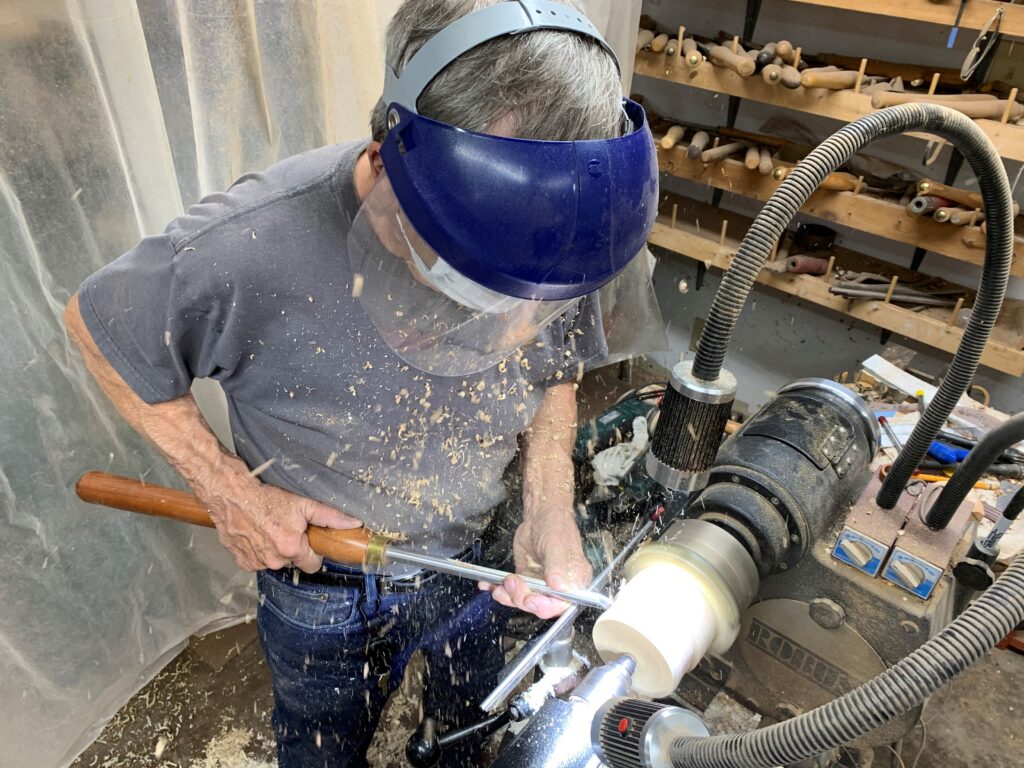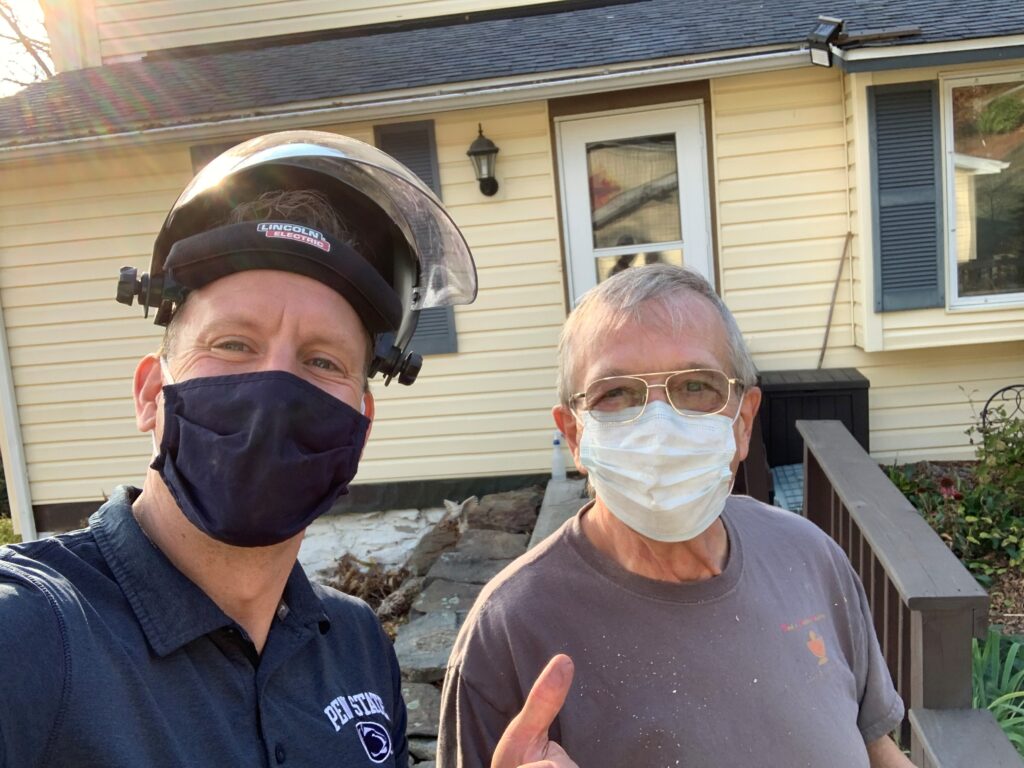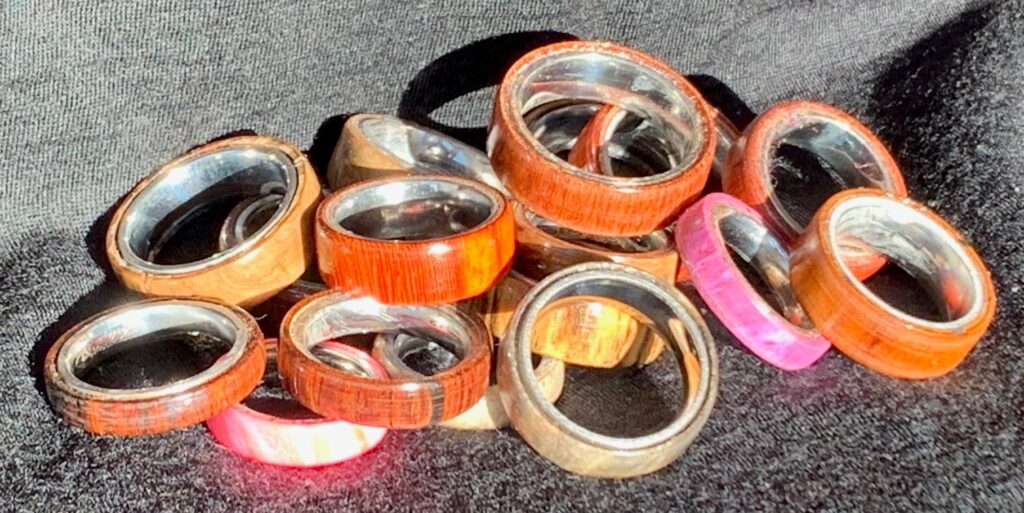It started with a YouTube video. This one, in fact, which for whatever reason drew me in like a moth to a flame. It looked so fun, so satisfying to take a small block of wood, pare it down on a lathe, and presto! – out pops a beautiful wooden ring as unique as a snowflake. I eagerly bought the necessary tools and followed the video’s instructions to a T, so why was I failing?
In my basement with lathe whirling and sawdust flying I’d carefully do exactly as instructed and bam! At some point the ring block would shatter. Bits of wood flying everywhere and my colorful expletives right on their heels. I tried different tools, different lathe speeds, and different angles but suffered the same frustrating result.
“Damn it!” I said to myself. “I really want to learn how to do this but I’m stuck.”
And given my impatient nature I knew I had to figure this out soon or this endeavor was going nowhere.
When you’re stuck on a problem, where do you turn? I tried the same avenues you might: Google, YouTube, even called a couple vendors who make woodturning tools but as you may find when turning to the internet or customer service lines, the responses were confusing and of little help. So I went to the one resource often overlooked but usually full of answers: old guys.
In this case, Fred Hill, a retired (yet vibrant!) professor who’s been perfecting his woodworking skills longer than I’ve been tying my own shoes. Fred has three valuable traits that you and I may not have yet earned: wisdom, experience, and patience.
Fred and I met last weekend in his woodshop, where we embarked on a quest to make the wooden rings that had alluded me. And while we blocked several hours for this lesson, within five minutes Fred discovered the root cause of my angst.
“Needs sharpening.”
“Excuse me?” I replied.
“Your tool. It’s dull. Needs sharpening,” he repeated.
“C’mon, Fred, these are brand new tools. The tools are fine.”
Fred, without saying another word, approached me, gently pulled the tool from my hand, and spent sixty seconds honing its edge on his grinding wheel. And from that moment forward, Fred and I cranked out the most beautiful rings you’ve ever seen.
You see, it wasn’t about the best tools or the strongest grip or the highest quality materials; the secret lay in how sharp the tool was. Even the slightest flaw on that cutting edge and the rings were sure to shatter. And for some strange reason neither the internet nor the tool vendor nor I, the impatient rookie, had called out this most obvious flaw.
How often do we set our tools to our work – our nose to the grindstone, if you will – without first ensuring our blades are as sharp as they need to be? Like me, how often do you give a presentation or hammer out emails or make a sales call without the slightest consideration for the style you’re using or the grammar you’re employing? Or muddle through the same old workout with sloppy form?
Next time you’re falling short of the result you desire, think of my new friend Fred. Would he, or his senior counterpart who’s spent a lifetime mastering the discipline you’re pursuing, take one look at your flailing attempt and declare, “Needs sharpening”? Just a little extra time sharpening our tools might be all it takes to transform failure into fulfillment.
Abe Lincoln said it best: “Give me six hours to chop down a tree and I will spend the first four sharpening the axe.”
Final note:
My time with Fred reminded me that in this COVID era we’re losing our most seasoned mentors at an alarming rate, including my stepfather-in-law, a military pilot and prolific storyteller who survived getting shot down in Vietnam and a fight with cancer but couldn’t overcome this blasted virus. Every time we lose a senior who’s still got lots to give, which is just about every one of ‘em, we lose a pool of wisdom and insight that’s yet to be fully tapped by those of us who need them.
Where in your life are you not getting the results you want? Beyond the fitful, muddled world of Google, how much effort have you made to meet the real-world senior expert in your community who could guide you to success? Seek them out. Befriend them. Thank them for sharing their guidance. And for God’s sake wear a mask.

Fred Hill working his magic with a sharp tool.
Thank you, Fred!
Fruits of labor
Ben- What a cool project! And I am super impressed that you own a lathe! And I love the life lesson of the story. Good stuff!
Colleen, My lathe is your lathe! Come on over, woodworker. Your granddaughters would love a new ring for Christmas. All the supplies are here waiting for you, including pink and purple wood blanks.
Ben, this is the best blog I’ve ever read. Loved the photo of you and Fred! Priceless. And this is so relevant when you hear talk that we sacrifice the elders to save the youth. As an older guy I really resent such talk. And I’m sorry to hear about your stepfather-in-law. I felt your loss in the words you expressed. Best to you and family. Jim
Jim, For me, Fred is to woodturning what you are to running: a guide and inspiration whose footsteps I am grateful to follow. No way we’re gonna sacrifice our most treasured mentors to facilitate a few more fraternity parties. Your comments always brighten my day; thank you for making the time to write them.
Another great story that gets us to stop and think. Hope to see you at the pool or on the road soon.
Bernie, You know where to find us on Tuesday and Thursday mornings. Looking forward to seeing you there!
Thank you, Ben. Very sage advice. And spending time with an older adult (mentor) is a gift to them as well.
Hello Bridget! Fred and I enjoyed lots of laughs, mostly at my expense as he guided this rookie through the basics. A great day for us both. Nice to hear from a leading SPRA Board volunteer 🙂
Great post, Ben … and an amazing result! The rings are fantastic!
Andy, The Krebs ladies would love these for Christmas. Come on over and we’ll crank some out.
Ben, I really liked this one. I spent a lot of my childhood learning stuff from “old guys”, which also includes many women. I was told by one of the old women that they prefer to be referred to as “wise women” rather than old women. So for purposes of this comment, I will refer to all of them collectively as the “wise folk”.
I learned how to cut stone, mend fences, make stuff out of metal and wood, weld, solder, slaughter hogs and cut up meat, can and freeze vegetables, cook, bake, knit, sew, and countless other skills. Every one of these “wise folk” was more than willing to share their wisdom. I learned a lot more than just the skill we were talking about.
If you have kids, I encourage you to start them at a young age hanging out with the “wise folk”. If they are already teenagers, it is a little more challenging, but not impossible. Seek out the wise folk yourself. I am at an interesting point in my life where I am still seeking out wise folk, but sometimes others come to me for wisdom. I guess I am a wise folk to them. Perhaps we are all wise folk.
“Wise Folk” – Yes, Cory, a much better term! Interesting, isn’t it, that these wise folk who statistically have less time to share are more open to doing so than their younger counterparts? Terrific call to action to connect our kids with community elders.
You are young but that doesn’t keep you from being my butterfly/breaststroke/swim technique wise folk 🙂
Ben is a natural on a lathe. And, I convinced him that I was able to teach him when in fact, he was teaching me! I learned a lot having him work with me. I can only imagine what sage advice he will be able to give a young whippersnapper when he is 77 ! I’d love to be around to hear it. Thanks Ben, you are an inspiration!
Fred, No doubt I’m only one of many, many students who thinks often of you and appreciates the lessons you taught them. I have a loooong way to go to match your skills but you better believe I’ll be sharpening them in an effort to pay forward the lessons you taught me.
Ben, thank you for the great story. Aside from the sharpening message, I found another nugget in your adventure.
I think your tools start to dull each time you apply them to a spinning piece of wood. Eventually this constant dulling (perhaps we can refer to this as, “damage accumulation”) reaches a point in which an intervention is required. That point might be considered a limit.
Now what if I told you about some wiz-bang technology in which we can continuously monitor that dulling? That tech is wireless and can send you an email or a text message alerting you to the level in which your tooling will be sufficiently dull and could lead to a catastrophic event (wood blowing up while trying to make rings). In fact this system has been developed by PhD’s that know everything about lathe wood shaping tool performance.
Pretty cool huh? But what if you never considered what to do once you learned your tooling was dull?
Fred saw the problem and he already had a plan for when that problem surfaced. He had the ability to correct that problem and continue with production.
Believe it or not, there are some technologies out there in which the slick salesperson might be able to show the value of gaining that insight far earlier than ever before. But if you don’t develop the appropriate escalation process to apply that knowledge, then you have a broken system. Just like Fred, knowledge is one thing…applying that knowledge is wisdom. He had the grinder and ability to resharpen your tools. No panic, just a little preventive maintenance and you were right back in business.
Without a proper escalation process, developed with those that are most impacted; you may simply learn you have dull tooling faster. If you don’t spend the time within your organization developing your escalation process, you are daring your teams to succeed rather than enabling them.
Brian, A “damage accumulation” algorithm, you say? That notifies me before product quality falls? I’m in ha ha! But a terrific reminder about an escalation process. How many times are we – or our teams – aware of a problem on the horizon but unaware of how/when/where/who to notify or the right action to take? Do I call call a blade sharpening shop? Funnel the request to a union worker? Buy a new tool? Run a grinding wheel that I’ve never before operated? etc etc
The devil’s in the details, and you’re just the man to guide us to everlasting machine life. Leave it to KCF’s only Lifetime Achievement honoree to point out this important ingredient. Thanks for the comment!